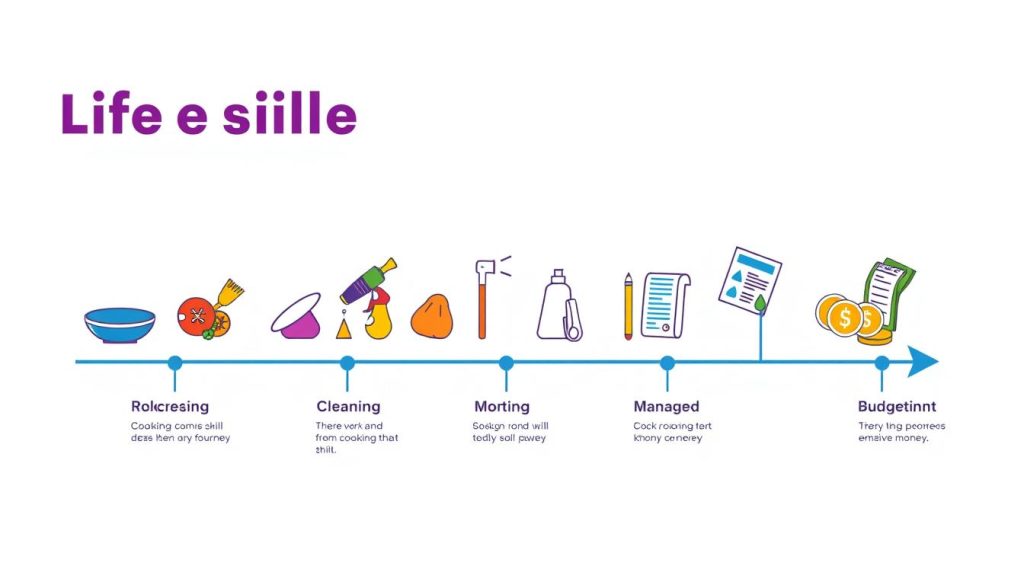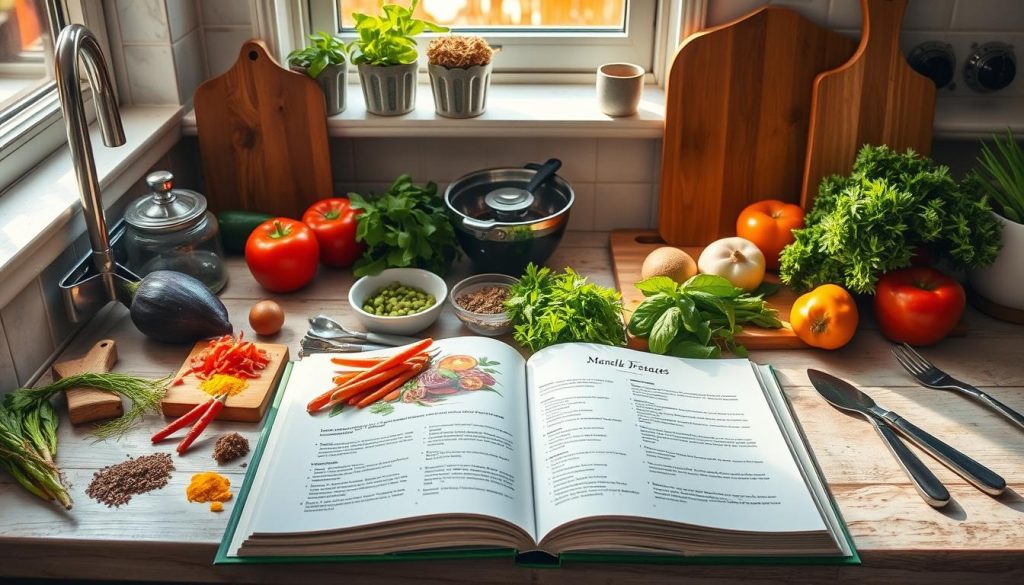Did you know 80% of parents think teaching time management helps a lot? It makes school and other activities easier. Learning to cook, clean, and manage money is key for growing up.
In this guide, I’ll give you tips and steps to become independent and smart with money. These skills are important for anyone, whether you’re in high school or just out of college. They help you feel confident and ready for adulthood.
Key Takeaways
- Understand the fundamentals of adult independence and self-sufficiency
- Set realistic goals for developing essential life skills
- Discover effective cooking techniques and kitchen organization
- Learn smart grocery shopping and meal planning strategies
- Master the art of efficient home cleaning and organization
- Gain financial literacy and build a solid budgeting system
- Develop time management skills for a balanced daily routine
Understanding the Fundamentals of Adult Independence
Learning life skills is key for being independent. It helps with money management and keeping a clean home. These skills help you reach your goals in life and work.
Building a Foundation for Self-Sufficiency
Studies show that life skills are important for feeling good and growing. Skills like budgeting and cooking help you feel in control. This feeling of control is the start of being independent and strong.
Setting Realistic Goals for Skill Development
To become independent, setting realistic goals is important. A 2019 study found that knowing about money is crucial. By setting small goals and tracking them, you can improve your skills and feel proud of yourself.
Creating a Personal Growth Timeline
Having a personal growth timeline helps you stay on track. It includes goals for money, home, and health. Breaking big goals into small steps lets you celebrate your wins and keep growing.

“Teaching autonomy to kids allows them to take ownership of tasks, problem solve, and handle failure.” – Jessica Lahey, author of “The Gift of Failure”
Life Skills How to Cook Clean Manage Money: A Comprehensive Guide
Young adults need to learn important life skills to live on their own. This guide helps with cooking, cleaning, and managing money. You’ll learn how to be good at home and with money with our easy tips.
Cooking Recipes for Beginners
Cooking can seem hard, but it’s very important. Our guide has simple, yummy recipes for you. You’ll learn how to plan meals and cook well.
Mastering Household Chores
A clean home is key for a happy life. We share top cleaning hacks and decluttering strategies. You’ll learn to keep your home neat and clean easily.
Financial Literacy and Budgeting Basics
Handling money can be tough, but it’s crucial. We cover budgeting techniques, debt management, and long-term financial planning. Learn to manage your money and plan for the future.
This guide gives you the skills for cooking, cleaning, and managing money. Start living your best life now!

“Mastering life skills is the key to unlocking a future of self-reliance and personal growth.”
Mastering Basic Cooking Techniques and Kitchen Safety
Cooking is a key skill that opens up a world of tasty dishes and healthy meals. But, you must first learn the basics of cooking and keep your kitchen safe.
Essential Kitchen Tools and Equipment
Having the right tools in your kitchen is very important. You’ll need a sharp chef’s knife, a strong cutting board, and good pots and pans. These basics will help you with many cooking tasks.
Understanding Food Safety and Storage
It’s important to handle and store food safely. Always wash your hands before and after touching raw foods. Also, be careful not to mix foods in a way that can make them unsafe.
Learn how to store different foods properly. This helps keep them fresh longer and reduces waste.
Basic Cooking Methods Everyone Should Know
- Sautéing: A quick, high-heat cooking method perfect for vegetables, meats, and more.
- Roasting: Bringing out the natural sweetness in foods like root vegetables and proteins.
- Boiling: A simple, versatile technique for cooking grains, pasta, and certain vegetables.
- Baking: Mastering the art of creating delicious breads, cakes, and other baked goods.
Learning these basic cooking techniques is a great start. It gives you a strong base to explore more in the kitchen. Remember, practice, patience, and a desire to learn are key to getting better.
Keeping your kitchen safe and organized is as important as cooking skills. Be careful of dangers like sharp knives, hot surfaces, and electrical appliances. Keep your kitchen clean, store food right, and dispose of waste properly. This ensures a safe and efficient place to cook.
Smart Grocery Shopping and Meal Planning Strategies
Learning to shop for groceries and plan meals can change your life. It helps you eat healthy and save money. Let’s look at how to shop smart and plan meals well.
Meal Planning: The Foundation for Success
Good meal planning is key to smart shopping. About 60% plan meals for a week, and 40% for a month. Around 70% cook meals ahead, 20% just before, and 10% do both.
Getting family involved helps over 80% make meals everyone likes.
Building a Balanced Pantry
Having the right pantry items is important. It makes shopping and cooking easier. Some must-haves include:
- Canned tomatoes (90% of households)
- Dried fruits like raisins and apricots (75% of households)
- Legumes such as lentils and beans (over 60% of households)
- Whole-grain cereals and oatmeal (over 80% of households)
- Extra-virgin olive oil (over 85% of households)
- Vegetable, chicken, and beef stock (over 70% of households)
- Ground herbs and spices (over 75% of households)
Choose items with few ingredients. Always check nutritional labels for better choices.
Grocery Shopping on a Budget
Staying within budget doesn’t mean you have to eat less healthy. Make a list and stick to it. This saves time and money. Avoid buying things you don’t need and choose fresh foods over processed ones.
“Meal planning and grocery shopping are essential skills for maintaining a healthy, cost-effective lifestyle. With a little practice, you can become a master of both and enjoy the benefits of a well-stocked kitchen and nutritious, delicious meals.”
Effective Home Cleaning Systems and Organizations
Keeping your home clean and organized is key to a stress-free life. This guide will show you how to clean room by room. It also covers natural cleaning and time-saving tips.
Room-by-Room Cleaning Checklist
Follow this easy checklist to clean your home:
- Kitchen: Clean counters, stovetop, empty trash, and load dishwasher.
- Bathrooms: Clean toilet, sink, mirror, and restock supplies.
- Bedrooms: Make beds, dust, and vacuum.
- Living Room: Straighten cushions, dust, and vacuum or sweep.
- Laundry Room: Sort, wash, fold clothes, and restock essentials.
Natural Cleaning Solutions and Products
Choose eco-friendly, safe cleaning products. Some top natural cleaners are:
- White vinegar: Great for surfaces, windows, and more.
- Baking soda: Softens tough stains and odors.
- Castile soap: A plant-based cleaner for floors, counters, and dishes.
- Essential oils: Add a nice scent with natural oils like lemon or lavender.
Time-Saving Cleaning Hacks
Use these smart cleaning tips to save time and effort:
- Get a robotic vacuum for easy floor cleaning.
- Use a squeegee for quick window and mirror cleaning.
- Keep a cleaning caddy in each room for easy access.
- Do laundry basics like folding and ironing while watching TV.
- Declutter and organize often to keep your home tidy.
With these cleaning systems, you’ll enjoy a clean, stress-free home. You’ll have more time for what’s important.
Financial Literacy and Budgeting Basics
Learning about money is key for growing up. It helps us make smart choices and reach our money goals. Knowing how to budget and manage money is very important.
Creating a balanced budget is at the heart of money skills. We need to watch our income, spending, and savings. This helps us stay within our budget. By knowing where our money goes, we can cut down on waste and save for what’s important.
Money skills also mean understanding different types of investments. We learn about stocks, bonds, and more. Knowing how to mix these investments helps us manage risks. Plus, learning about credit, debt, and saving for the future is crucial for success.
| Asset Class | Description | Risk Level |
|---|---|---|
| Cash and Cash Alternatives | Includes certificates of deposit, money market funds, and US Treasury Bills | Low |
| Bonds | Fixed-income securities issued by governments, corporations, or other entities | Moderate |
| Stocks | Ownership shares in publicly traded companies | High |
| Alternative Investments | Includes real estate, private equity, hedge funds, and commodities | High |
With good money skills, we can handle our finances well. We make choices that match our values and goals. This knowledge helps us as we grow and manage our money.
Remember, learning about money is a lifelong journey. It’s never too early to start.
“Financial literacy is the ability to understand how money works in the world: how someone manages to earn or make it, how that person manages it, how he/she invests it (and grows it), and how that person donates it to help others.” – Suze Orman
Developing Time Management Skills for Daily Tasks
Learning to manage your time well is key to a good work-life balance. By making daily routines and using tech, you can do more and feel less stressed. This way, you have more time for what’s important to you.
Creating Efficient Daily Routines
Having a daily routine can really help you manage your time. First, figure out what tasks are most important. Then, set times for work, chores, and fun. Try to stick to your plan as much as you can.
This helps you stay focused and avoid distractions. It also makes sure you get everything done.
Balancing Work, Chores, and Personal Time
It’s hard to balance work, home tasks, and personal time. To find a good balance, divide your day into clear parts. Set times for work, chores, and fun activities.
This keeps you from getting too tired and makes sure you have time for yourself.
Using Technology for Better Organization
Technology can really help you manage your time better. Use apps, calendars, and tools to stay organized. These tools remind you of tasks and help you plan your day.
By learning to manage your time, making good routines, and using tech, you can take back control. You’ll live a more balanced and happy life. Remember, it takes practice, but you can do it.
| Skill | Benefit | Strategies |
|---|---|---|
| Time Management | Increased productivity, reduced stress, and better work-life balance |
|
| Household Chores | Develop practical skills, promote responsibility, and strengthen family bonds |
|
| Work-Life Balance | Improved mental health, increased job satisfaction, and better personal relationships |
|
“Developing time management skills is not just about becoming more productive; it’s about creating a harmonious balance between the demands of work, home, and personal well-being.”
Building Healthy Habits Through Self-Care and Organization
I’m working hard to live a balanced and happy life. I’ve learned how important self-care and being organized are. In today’s world, we need to take care of ourselves and make habits that help us stay healthy.
Mindfulness is a big part of self-care for me. Simple things like deep breathing or meditation help me deal with stress. Research shows that being kind to ourselves lowers stress. This is good for our minds and bodies.
Healthy habits are also key. Getting enough sleep, eating well, and moving more make me feel better. Even small actions like meal prep or a walk can change my day for the better.
FAQ
What are the key life skills covered in this guide?
This guide teaches you how to cook, clean, and manage money. It’s all about becoming independent and self-sufficient.
Why is it important to set realistic goals and create a personal growth timeline?
Setting goals and making a timeline is key. It helps you grow, overcome challenges, and learn important life skills.
What are some of the basic cooking techniques and kitchen safety tips covered in the guide?
You’ll learn about kitchen tools, food safety, and cooking basics. It also teaches you how to keep your kitchen safe and organized.
How does the guide help with smart grocery shopping and meal planning?
It teaches you to shop smart and plan meals. This helps you eat healthy and save money.
What type of cleaning and organization tips are included in the guide?
You’ll get a cleaning checklist and tips for natural cleaning. It also covers laundry basics to keep your space tidy.
How does the guide help build financial literacy and budgeting skills?
It teaches budgeting and managing money. You’ll learn to avoid debt and plan for the future.
What time management techniques are discussed in the guide?
It shows you how to organize your day. You’ll learn to balance work, chores, and personal time. It also talks about using tech to stay organized.
How does the guide address building healthy habits through self-care and organization?
It teaches stress management and self-care. You’ll learn to take care of yourself and stay well, even when life gets tough.

